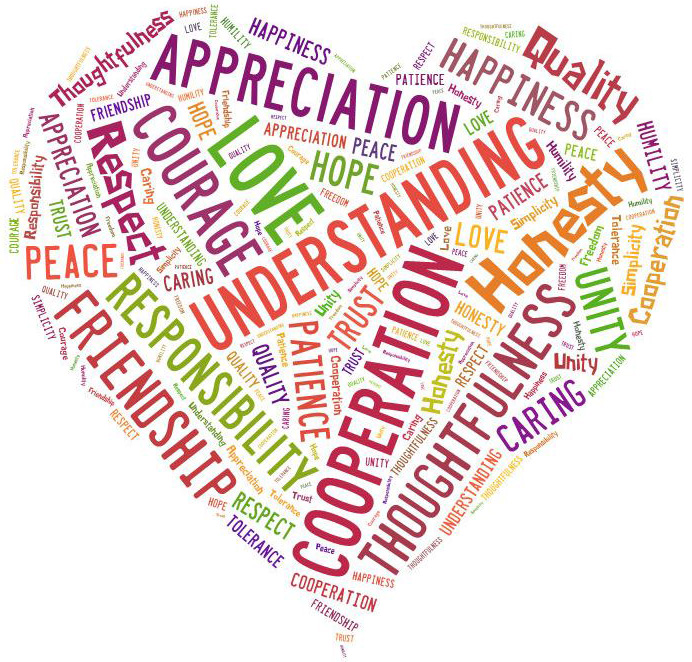Core values are the fundamentals beliefs held by a person. These provide an outlook on life and often its primary goals and purpose. Say if one of your primary beliefs is oneness of God and is driven by Holy Quran, then your goals will not align with someone who believes YOLO (You only live once).
While the goal of this website is to encourage you to take control of your life, finances, relationships, happiness and live a fulfilling life but at the same time we cannot understate the important of primary values and goals. Unless primary values and goals change which is not something that happens often, without fulfilling them or at least striving to fulfil them will result is superficial happiness.
Let us take an example to explain this. Say if you are a Muslim and your core belief is that this World is a test and you will be rewarded or punished in the hereafter for whatever you do in this World. Then while money, high-income job, an attractive spouse, large house will inspire and even please you in the short term, it is very likely that in the long term these things will make you depressed. You will begin questioning your life. The cause eludes lot of successful people but it’s quite simple actually that all these ‘successes’ and ‘accomplishments’ are not exactly contributing to your primary goal and value. In fact, materialism is the direct opposite of religious teachings.
The most common values people relate to are:
- Love & care
- Success
- Freedom
- Intimacy
- Security
- Adventure
- Power
- Passion
- Comfort
- Health
- Religion
Can you relate to those? Do you have emotions from this list that you value most?
If so, that means you have values. We all have them and we should look at using these primary values to drive us forward in life.
The Meaning of Values
Many of the qualities a person uses to describe another are your values.
Generally, a person sees values as a standard composing of principles that hold immense value to a person. Every person is able to detect values by observing the passion that someone has for a particular ethical and moral code. Values form the basis and core of your life and they are a part of your daily conduct. It is something that defines you day in and day out. It is also how people will always remember you, because you have invested yourself in these core values and they have been your foundation. If you have grown up in a dysfunctional home, you may have very different set of values. E.g. if you are used to seeing abuse in your house your idea of values would be respect, honour, listening to the head of the family but they would be in a negative sense. In your mind, you may see them as positive and they will go onto define you in this way.
The Benefits of Values
A person who is conscious of their ideals will live a focused and fruitful life. Your behaviour and decisions will be guided by your values, helping you to achieve your goals. They serve as a measuring stick. making you conscious of your behaviours and whether they are in line with your beliefs. The benefit of the measure is that it discourages risk-taking and encourages progress toward goals. By identifying your values, you may focus on what matters most and have a clearer purpose.
Define your Core Values.
Decide to do better and follow these easy steps to define your core values:
- Go to your secret space. A quiet, unhurried environment where you may think clearly. It might be meditation or prayer—whatever seems safe to you.
- Consider the legacy you want to leave. Some questions to consider are “Who are you now?” and “How do you see yourself in the future?” What is vital and how would your ideal hold values? What would you base your life on?
- Take notes on your ideas. Create a list of 20 values. Use two columns to list them. 10 values in each column. For example, integrity, character, personal courage, wealth, wise, kindness, religion.
- Now begin to narrow your list down. Cross out the one of lesser importance in each row. Repeat one more time until you have five words left.
- Rank your top five. The last five remaining are your values. The rankings come in handy when you have decisions to make that may conflict.
- Put in place your values. In every facet of your life. For example, decision-making, goal setting, prioritizing your schedule, personal and business relationships.
- Reaffirm your values. Do this annually, then compare the previous years. You can then see which values remain constant and which change constantly.
Finally, remember, values are those qualities that define you. The standards by which you measure life. There is no promise that this exercise will bring you success or keep you on the right track. That depends on you. Even after being raised on a good set of values, people have tripped and fell to the ground. We have all had moments and will have more moments where we find ourselves on the ground, looking up. It is what a person does in the aftermath that defines their character and values.
